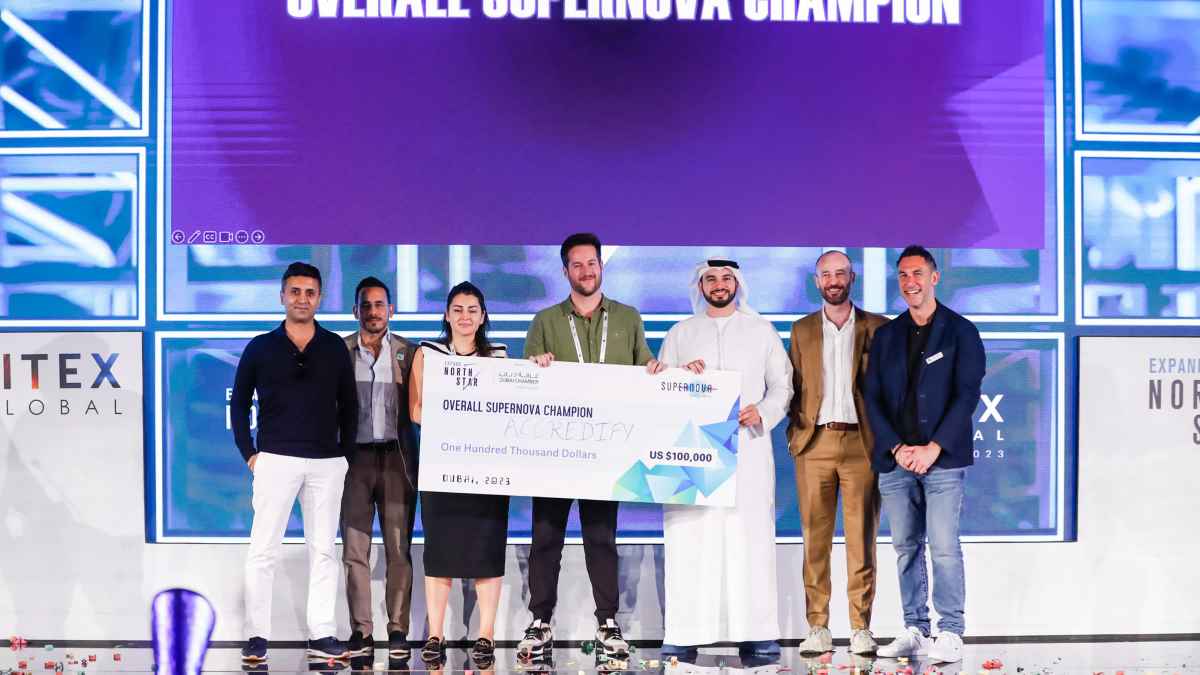The Supernova Challenge is the biggest pitch competition in the Middle East, Africa and South Asia
DUBAI, United Arab Emirates, October 19, 2023/APO Group/ —
Accredify, a Singapore-based startup and service provider for issuing verifiable documents and information, has emerged as the champion of the 2023 Supernova Challenge at Expand North Star Dubai (https://www.ExpandNorthStar.com/), the world’s largest startup event. The startup received the $100,000 grand prize after an intense final round of pitching against 27 global finalists from 521 entries.
The Supernova Challenge in partnership with the Dubai Future District Fund, is the region’s biggest startup pitch competition, offering $200,000 in total cash prizes. The challenge is a key feature of Expand North Star Dubai, which hosted its biggest edition this year. It attracted over 1800+ startups from over 100 countries to explore the emerging opportunities in Dubai’s dynamic, diverse and tech-driven digital economy.
Simon Gordon, Chief Commercial Officer of the winning team, said, “Supernova 2023 has been an incredible experience. It’s surreal to win this challenge at Expand North Star. This region, particularly the UAE, has so many great opportunities, and we are excited about using this prize money to expand our presence here.”
One of the judges at Supernova, Sharif El-Badawi, CEO of Dubai Future District Fund, commented, “It is encouraging to see a shift towards sustainable solutions that are better for the planet and its people. We witnessed several startups delivering concise yet compelling pitches that could impact our lives. The pitches we witnessed here at the Supernova Challenge are brimming with promise, unique innovations, and inspiring ideas.”
An expertly curated list of categories covered the latest trends in tech, inviting startups to showcase innovations that can solve some of our most pressing challenges. These included AI Disruptor, Fintech & Ecommerce Disruptor, Blockchain & Web3 Disruptor, Mobility & Smart Cities Disruptor, Healthtech & Wellness Disruptor, Martech Disruptor, Insurtech Disruptor in partnership with MENA Insuretech, Female Founder Award in partnership with the Sharjah Businesswomen Council, Africa Fast Award presented by GITEX Africa, Asia Fast Award, India Fast Award, and the Top MENA Award. In collaboration with GITEX Impact and Future Urbanism, Expand North Star also awarded the most proficient Sustainability and ESG Disruptor.
Thirteen category winners representing the USA, India, UAE, South Korea, France, UK, Nigeria, Switzerland, China and Bangladesh took home $8,000 each in prize money, while the winner of the Female Founder Award won $10,000.
The Supernova Challenge category winners were:
Sustainability and ESG Disruptor: Zenerate from the USA, a platform providing AI-powered feasibility solutions for real estate development.
AI Disruptor: Knorish, a platform that enables hobbyists, professionals and niche experts to build, launch, market and sell online courses powered by their own knowledge and as an extension of their own brand.
Fintech and E-commerce Disruptor: Appro Technologies from the UAE, a digital platform simplifying retail banking onboarding.
This region, particularly the UAE, has so many great opportunities, and we are excited about using this prize money to expand our presence here
Blockchain and Web3 Disruptor: Verofax from the UAE, a platform enabling real-time consumption data by offering a unique microsite per product.
Mobility and Smart Cities Disruptor: Innocel from France, a company providing clean energy solutions for a net zero future.
Healthtech and Wellness Disruptor: Skia from Korea, a digital surgery guide solution using augmented reality (AR) technology.
Martech Disruptor: Smartzer from the UK is a SaaS platform brands use to make live streams and videos interactive and shoppable to drive sales.
Female Founder Award: Matis from Switzerland, a platform empowering art market stakeholders with accessible and quantifiable tools for art authentication.
Africa Fast Award: Gifty from Nigeria, an app that helps people easily share gift lists with family and friends and avoid duplicating purchases.
Asia Fast Award: Urtopia from China, a company dedicated to revolutionizing urban transportation with its smart, sleek, and stealthy e-bikes.
India Fast Award: EyeROV from India, a marine robotics company providing underwater ROVs (remotely operated vehicles) to various industries.
Insurtech Disruptor: InsureCow from Bangladesh, a platform offering a 360° technology-powered cattle insurance and wellbeing monitoring solution.
Top MENA Award: Jalebi.io from the UAE is the world’s first restaurant operating system that helps restaurants save 5% on the cost of every order served.
The Supernova Challenge featured 40 startups selected from the Expand North Star global roadshow, a series of international pitch competitions held by the Dubai World Trade Centre and DCDE to attract startups to Dubai and foster collaborations with digital ecosystems in various countries.
Expand North Star hosted by Dubai Chamber of Digital Economy (DCDE) is the powerhouse startup show of GITEX Global, organized by the Dubai World Trade Centre (DWTC) concluded this week marking its largest-ever edition at its new Dubai Harbour venue.
For more information, please visit ExpandNorthStar.com
Distributed by APO Group on behalf of Expand North Star.


 Business5 days ago
Business5 days ago
 Business4 days ago
Business4 days ago
 Business5 days ago
Business5 days ago
 Business5 days ago
Business5 days ago
 Events4 days ago
Events4 days ago
 Energy3 days ago
Energy3 days ago
 Energy4 days ago
Energy4 days ago
 Events4 days ago
Events4 days ago













